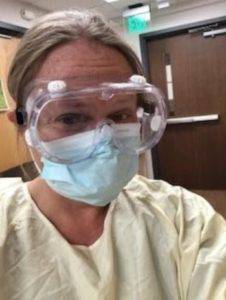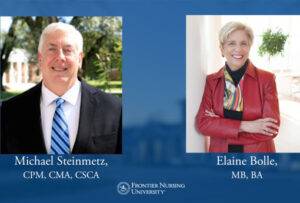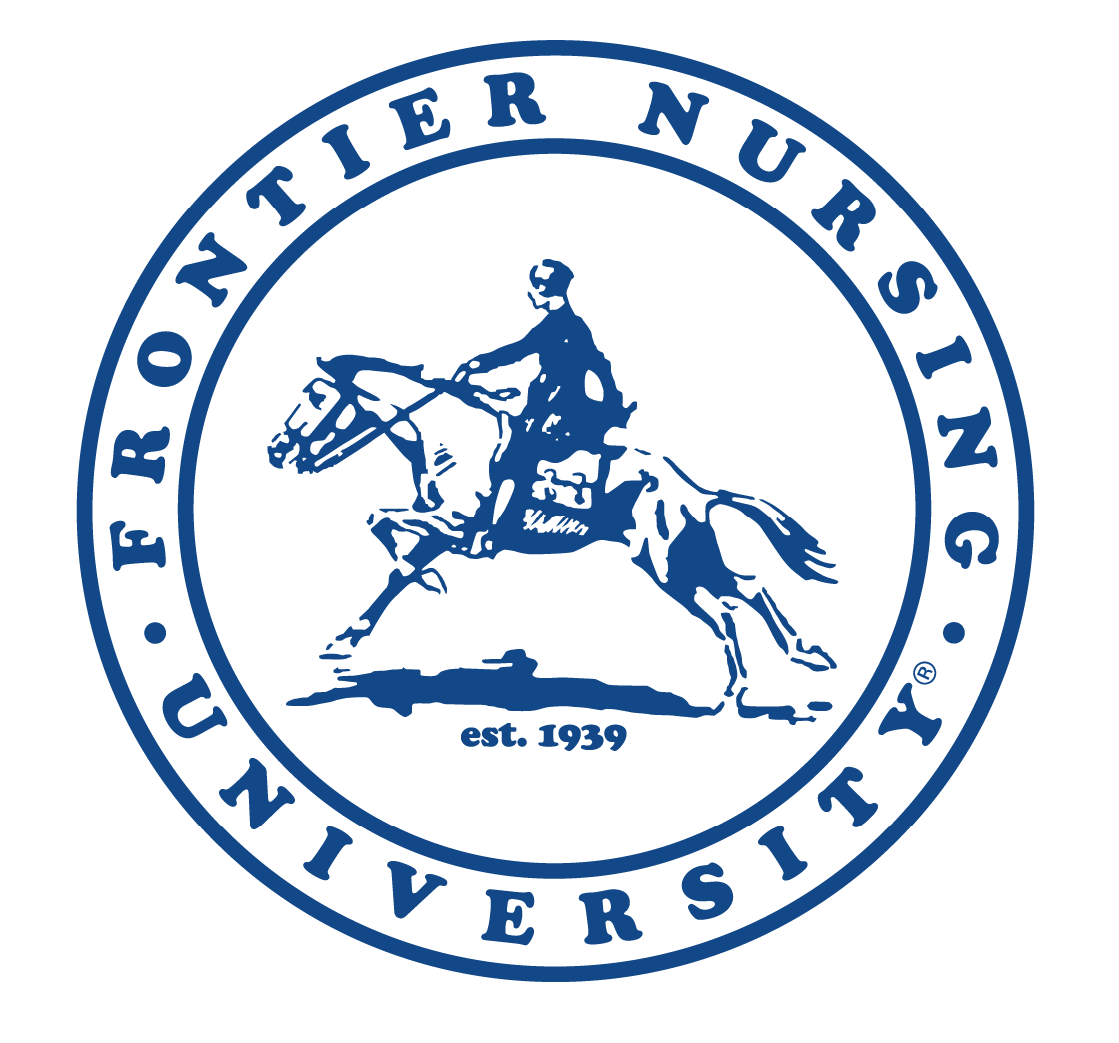The Frontier community is proud to have students and alumni serving on the front lines of the COVID-19 pandemic. Throughout the next few weeks, we are committed to sharing their stories in order to provide insight, hope and encouragement. Thank you to all the health care workers who are risking their own well-being daily to serve our nation. Click here to read more stories of courage and dedication.
Editor’s Note: Following is a personal account from the front lines of one of the COVID-19 hotspots, written by Joy McElyea, MSN, CNM, RN, CNEP Class 149, DNP Class 33, on April 1, 2020. We thank Joy for her work and allowing us to share her story.
 I am a CNM and RN in Gunnison, Colo., a small town in Western Colorado that is one of the COVID-19 hotspots (last I checked we were number six, just below places in New York and Louisiana). Our county includes a ski resort — and ours, along with two or three others in Colorado, were among the earliest places hit. I’ve been on the front lines for a few weeks now, and I admit, I’m tired.
I am a CNM and RN in Gunnison, Colo., a small town in Western Colorado that is one of the COVID-19 hotspots (last I checked we were number six, just below places in New York and Louisiana). Our county includes a ski resort — and ours, along with two or three others in Colorado, were among the earliest places hit. I’ve been on the front lines for a few weeks now, and I admit, I’m tired.
We are all nurses first, and this has primarily been my role. I’m a CNM in an outpatient clinic only (no deliveries), so initially I did see all of the OB patients in our clinic (my OB was one who was sick early on), counseling and answering questions based on what limited information we had. But primarily, I’ve been working at our small, critical access hospital in an RN role. Because we’re small, our staff is all cross-trained—I’m labor and delivery and medical surgery. My nursing background is corrections and long-term care. But these days, I’m standing next to ER doctors and EMS crews who are intubating my patients to send them to another, higher-care facility. We don’t have an ICU. Because we were hit early, we are still able to ship our patients to other hospitals in the state. I worry about when we can’t and suddenly I am the one taking care of that intubated, vented patient. I can only imagine the fear in larger hospitals, worrying about what to do there when beds and ventilators run out.
As an advanced practice registered nurse (APRN), I know I’m trained well. I know how to stay calm, look at the big picture, utilize resources, quiet my mind, and find the steady voice to tell my patient they will be okay just prior to sedation. Later, I can find the strength to call my patient’s daughter and tell her that just before intubation, her father was calm and was able to laugh. And later still, in the quietness of a country night while I’m out walking my dogs (even quieter now that our county is on lockdown), I’m also able to tell myself that I will be okay.
I’ve watched the wave of awareness sweep over social media. The disbelief and downplaying, the shock when it hits someplace close, the panic over increasing reports from front lines, and then the sudden gut-punching awareness when it’s your patient. Just as silence in health care can be ominous (no infant cry after delivery, decreased breath sounds on auscultation, absence of heartbeat on a pronounced patient), the silence today on my news feed is also ominous. It means we’re all in the thick of it. We’re all telling ourselves to take that deep breath. We’re all so unbelievably tired.
The comforting routine of school returns for me next week (I have one term left in my DNP program). I am so thankful that Frontier continues on, adapting just like all of us on the front lines, supporting students just as we support our patients. Healthcare will be different after this, but the flexibility, empathy, understanding and forward thinking nature of the FNU community will prepare us well for whatever role we find ourselves in. And for that, I am grateful.





 Vanessa Cameron works for Vanderbilt University Medical Center in Nursing Education & Professional Development. She is also attending George Washington University and progressing towards a PhD in Nursing with an emphasis on ableism in nursing. After becoming disabled in April 2021, Vanessa’s worldview and perspective changed, and a recognition of the ableism present within healthcare and within the culture of nursing was apparent. She has been working since that time to provide educational foundations for nurses about disability and ableism, provide support for fellow disabled nursing colleagues, and advocate for the disabled community within healthcare settings to reduce disparities.
Vanessa Cameron works for Vanderbilt University Medical Center in Nursing Education & Professional Development. She is also attending George Washington University and progressing towards a PhD in Nursing with an emphasis on ableism in nursing. After becoming disabled in April 2021, Vanessa’s worldview and perspective changed, and a recognition of the ableism present within healthcare and within the culture of nursing was apparent. She has been working since that time to provide educational foundations for nurses about disability and ableism, provide support for fellow disabled nursing colleagues, and advocate for the disabled community within healthcare settings to reduce disparities. Dr. Lucinda Canty is a certified nurse-midwife, Associate Professor of Nursing, and Director of the Seedworks Health Equity in Nursing Program at the University of Massachusetts Amherst. She earned a bachelor’s degree in nursing from Columbia University, a master’s degree from Yale University, specializing in nurse-midwifery, and a PhD from the University of Connecticut. Dr. Canty has provided reproductive health care for over 29 years. Her research interests include the prevention of maternal mortality and severe maternal morbidity, reducing racial and ethnic health disparities in reproductive health, promoting diversity in nursing, and eliminating racism in nursing and midwifery.
Dr. Lucinda Canty is a certified nurse-midwife, Associate Professor of Nursing, and Director of the Seedworks Health Equity in Nursing Program at the University of Massachusetts Amherst. She earned a bachelor’s degree in nursing from Columbia University, a master’s degree from Yale University, specializing in nurse-midwifery, and a PhD from the University of Connecticut. Dr. Canty has provided reproductive health care for over 29 years. Her research interests include the prevention of maternal mortality and severe maternal morbidity, reducing racial and ethnic health disparities in reproductive health, promoting diversity in nursing, and eliminating racism in nursing and midwifery. Dr. Lisa Meeks is a distinguished scholar and leader whose unwavering commitment to inclusivity and excellence has significantly influenced the landscape of health professions education and accessibility. She is the founder and executive director of the DocsWithDisabilities Initiative and holds appointments as an Associate Professor in the Departments of Learning Health Sciences and Family Medicine at the University of Michigan.
Dr. Lisa Meeks is a distinguished scholar and leader whose unwavering commitment to inclusivity and excellence has significantly influenced the landscape of health professions education and accessibility. She is the founder and executive director of the DocsWithDisabilities Initiative and holds appointments as an Associate Professor in the Departments of Learning Health Sciences and Family Medicine at the University of Michigan. Dr. Nikia Grayson, DNP, MSN, MPH, MA, CNM, FNP-C, FACNM (she/her) is a trailblazing force in reproductive justice, blending her expertise as a public health activist, anthropologist, and family nurse-midwife to champion the rights and health of underserved communities. Graduating with distinction from Howard University, Nikia holds a bachelor’s degree in communications and a master’s degree in public health. Her academic journey also led her to the University of Memphis, where she earned a master’s in medical anthropology, and the University of Tennessee, where she achieved both a master’s in nursing and a doctorate in nursing practice. Complementing her extensive education, she completed a post-master’s certificate in midwifery at Frontier Nursing University.
Dr. Nikia Grayson, DNP, MSN, MPH, MA, CNM, FNP-C, FACNM (she/her) is a trailblazing force in reproductive justice, blending her expertise as a public health activist, anthropologist, and family nurse-midwife to champion the rights and health of underserved communities. Graduating with distinction from Howard University, Nikia holds a bachelor’s degree in communications and a master’s degree in public health. Her academic journey also led her to the University of Memphis, where she earned a master’s in medical anthropology, and the University of Tennessee, where she achieved both a master’s in nursing and a doctorate in nursing practice. Complementing her extensive education, she completed a post-master’s certificate in midwifery at Frontier Nursing University.









 Dr. Tia Brown McNair is the Vice President in the Office of Diversity, Equity, and Student Success and Executive Director for the Truth, Racial Healing, and Transformation (TRHT) Campus Centers at the American Association of Colleges and Universities (AAC&U) in Washington, DC. She oversees both funded projects and AAC&U’s continuing programs on equity, inclusive excellence, high-impact practices, and student success. McNair directs AAC&U’s Summer Institutes on High-Impact Practices and Student Success, and TRHT Campus Centers and serves as the project director for several AAC&U initiatives, including the development of a TRHT-focused campus climate toolkit. She is the lead author of From Equity Talk to Equity Walk: Expanding Practitioner Knowledge for Racial Justice in Higher Education (January 2020) and Becoming a Student-Ready College: A New Culture of Leadership for Student Success (July 2016 and August 2022 Second edition).
Dr. Tia Brown McNair is the Vice President in the Office of Diversity, Equity, and Student Success and Executive Director for the Truth, Racial Healing, and Transformation (TRHT) Campus Centers at the American Association of Colleges and Universities (AAC&U) in Washington, DC. She oversees both funded projects and AAC&U’s continuing programs on equity, inclusive excellence, high-impact practices, and student success. McNair directs AAC&U’s Summer Institutes on High-Impact Practices and Student Success, and TRHT Campus Centers and serves as the project director for several AAC&U initiatives, including the development of a TRHT-focused campus climate toolkit. She is the lead author of From Equity Talk to Equity Walk: Expanding Practitioner Knowledge for Racial Justice in Higher Education (January 2020) and Becoming a Student-Ready College: A New Culture of Leadership for Student Success (July 2016 and August 2022 Second edition).